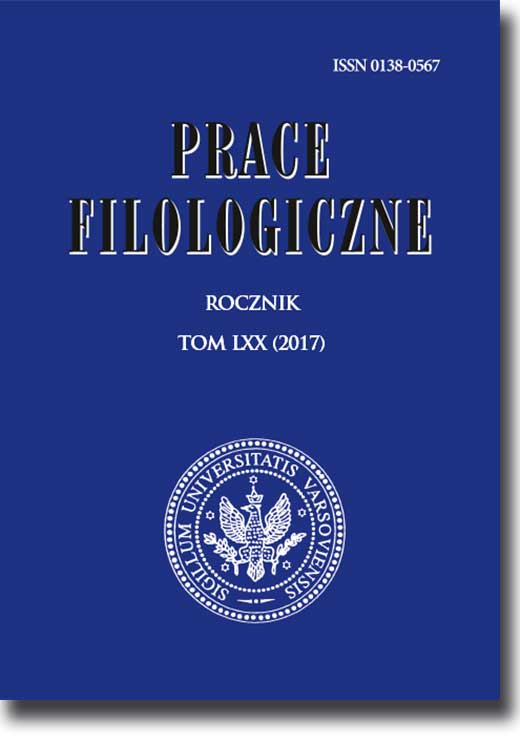Повторимые вaлентности предикaтов в русском языке: теоретические проблемы и прaктические решения
Repeatable Valencies of Predicates in Russian: Theoretical Issues and Practical Solutions
Author(s): Leonid Leibovich IomdinSubject(s): Theoretical Linguistics, Applied Linguistics
Published by: Wydział Polonistyki Uniwersytetu Warszawskiego
Keywords: syntactic structure; dependency tree; predicates; actants; repeatable and non-repeatable valencies; external possessor
Summary/Abstract: The Meaning ⇔ Text linguistic theory assumes that syntactic relations linking a predicate word with any of its actants, i.e. expressions that instantiate valencies of this predicate word, are non-repeatable: a predicate cannot have more than one subject, one direct object etc. Yet, if a predicate word has certain non-core semantic valencies (e.g. valency of location, starting point,destination point, time) this assumption does not always hold, as in sentences like {В Москве он жил на Таганке} ‘In Moscow he lived in Taganka district’, {Он поехал в город на работу} lit. ‘He went to town to workplace’, {Конференция начнется утром в 9 часов} ‘The conference will start in the morning at 9 o’clock’ etc. The paper discusses these phenomena and offers solutions that allow its adequate treating in syntactic analysis. The affinity of structures with repeated valency instantiation, on the one hand, and those with an external possessor like {Охотник посмотрел тигру в глаза} ‘The hunter looked the tiger in the eyes’, on the other hand, is demonstrated.The Meaning ⇔ Text linguistic theory assumes that syntactic relations linking a predicate word with any of its actants, i.e. expressions that instantiate valencies of this predicate word, are non-repeatable: a predicate cannot have more than one subject, one direct object etc. Yet, if a predicate word has certain non-core semantic valencies (e.g. valency of location, starting point, destination point, time) this assumption does not always hold, as in sentences like {В Москве он жил на Таганке} ‘In Moscow he lived in Taganka district’, {Он поехал в город на работу} lit. ‘He went to town to workplace’, {Конференция начнется утром в 9 часов} ‘The conference will start in the morning at 9 o’clock’ etc. The paper discusses these phenomena and offers solutions that allow its adequate treating in syntactic analysis. The affinity of structures with repeated valency instantiation, on the one hand, and those with an external possessor like {Охотник посмотрел тигру в глаза} ‘The hunter looked the tiger in the eyes’, on the other hand, is demonstrated.The Meaning ⇔ Text linguistic theory assumes that syntactic relations linking a predicate word with any of its actants, i.e. expressions that instantiate valencies of this predicate word, are non-repeatable: a predicate cannot have more than one subject, one direct object etc. Yet, if a predicate word has certain non-core semantic valencies (e.g. valency of location, starting point, destination point, time) this assumption does not always hold, as in sentences like {В Москве он жил на Таганке} ‘In Moscow he lived in Taganka district’, {Он поехал в город на работу} lit. ‘He went to town to workplace’, {Конференция начнется утром в 9 часов} ‘The conference will start in the morning at 9 o’clock’ etc. The paper discusses these phenomena and offers solutions that allow its adequate treating in syntactic analysis. The affinity of structures with repeated valency instantiation, on the one hand, and those with an external possessor like {Охотник посмотрел тигру в глаза} ‘The hunter looked the tiger in the eyes’, on the other hand, is demonstrated.
Journal: Prace Filologiczne
- Issue Year: 2017
- Issue No: 70
- Page Range: 47-58
- Page Count: 12
- Language: Russian

